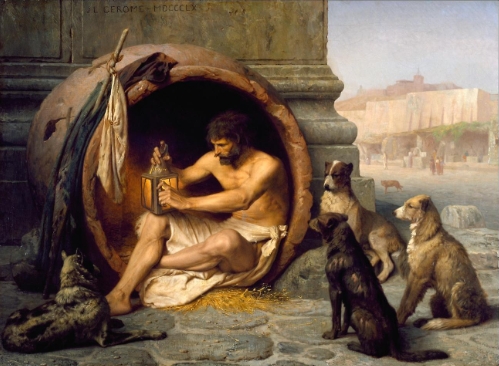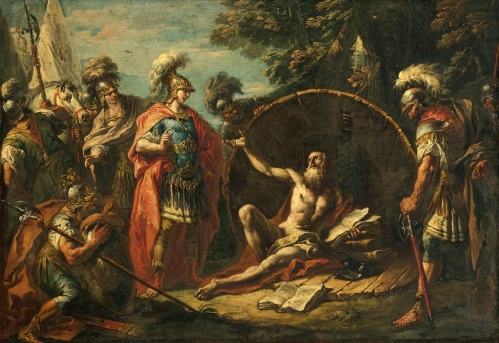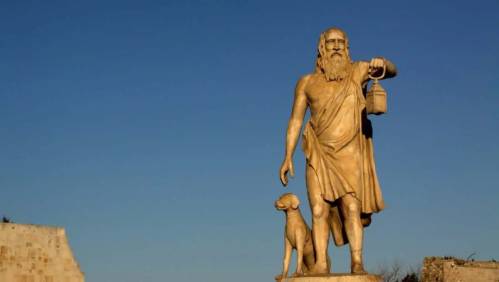🧠 Three Important Concepts of Cynic Philosophy
🗣️ Freedom of Speech
People are free to openly express their thoughts without expecting any consequences, punishment, or reward. Everything—absolutely everything—should be said clearly and straightforwardly, without beating around the bush. If they do not do this, true freedom cannot be spoken of, and such people can only be called slaves. A person must never come under the protection of any political or personal individual or institution.
🛠️ Self-Sufficiency
A person should reject the material riches of the world and live with as few possessions as possible; they should not chase after fame, glory, or status. If they do, they can only be called slaves. By shedding their weaknesses as much as possible, a person can proceed on the path to wisdom. Thus, those who live with their weaknesses or for their weaknesses should immediately break the chains around their neck, take nature as an example, and attain a free life.
🧗 Training
A person should train themselves to survive even in the harshest and toughest conditions.
🏕️ They must learn to step out of their comfort zone,
💪 Be resilient against physical challenges,
😨 Learn to confront and fight their fears.
For this, they must not neglect both physical and mental exercises.
Antisthenes recommends hardship and pain instead of pleasure, because these are what develop a person and provide real experience.
Diogenes’ Philosophy and Life
Diogenes of Sinope (Turkey), one of Antisthenes’ students in the Cynic School, took this radical attitude to the extreme, arguing that all institutions of civilization should be discarded as foolish things incompatible with human nature. Born in Sinope, Diogenes was exiled from there due to a counterfeiting accusation against his father and never returned for the rest of his life. At one point, he was captured during a sea journey and lived as a slave. Slavery in Athens at that time was different from the slavery known in past civilizations or the slavery of Africans brought to America, who had no rights. Nearly every wealthy or middle-class family had a slave who mostly handled household chores, shopping, and childcare. This was not very different from today’s employees. Diogenes’ slave days were spent in such duties, and he told his master that he was good at “managing people.” Indeed, in Xeniades’ house, he took over all management and even educated his children. Later, he came to Athens and initially sought a small house to live in, but when he had no money, he started living in a barrel in the courtyard of the Kybele temple. Although called a barrel, it was actually a large ceramic jar. While Diogenes did not live continuously in this barrel throughout his life, he did spend his later years there, and it is known that he would turn the barrel toward the sun’s direction. To outsiders, he appeared as a pitiable and vagabond beggar who did not care about his clothing.

Diogenes’ View of People
When he started giving philosophy lessons in the public square, no one came, but when he began singing songs, people gathered. He mocked people by saying, “You don’t come for serious things, you rush to where the antics are,” and claimed that it was not worth explaining philosophy to them. It is said that once he called people to the square, and when they gathered, he attacked them with his stick, shouting “I called the people, not the filth.” It is also known that during the day he walked around holding a torch saying “I am looking for a human.” Diogenes considered himself a citizen of the world and defined philosophy as “being prepared for all the whims of fate.” To people uninterested in philosophy, he said “If living well does not matter to you, then why do you live?” He believed the best thing in life was to speak simply and said, “Orators say true things about justice in their speeches but do not actually apply them.” One day, seeing a child drinking water with his hands, he threw away his wooden spoon used for drinking and said “Nature has given me the truest spoon.”
Diogenes and Alexander the Great
When Macedonian King Alexander the Great met Diogenes in Corinth and asked who he was, Diogenes replied simply, “I am Diogenes the Dog.” Shocked by this answer, Alexander asked if he wanted anything from him, to which Diogenes gave another striking response: “Just don’t block my sunlight.” Someone who has nothing to lose fears no one and speaks their mind freely, even if their interlocutor is a king. Alexander was in fact impressed by Diogenes’ fearless attitude. It is also known that he referred to Alexander as a “poor wretch.”

If You Don’t Do Philosophy, Why Do You Live?
When Diogenes said, “When I die, bury me face down. One day, everything will be turned upside down anyway,” Aristippus, founder of the Cyrene School, asked what he gained from philosophy. Diogenes replied: “I became rich without owning a single penny.” Diogenes saw philosophy as the only means to elevate a person to the highest rank, almost to the level of gods, and defined those uninterested in philosophy as people living in vain. To someone who said they disliked philosophy, he said “Then why do you live?” Regarding this, he also said, “Truth hurts a fool; lies are sweet to them.” Those who want to exalt themselves can only do so through philosophy, in other words, by looking at truths and the sun without blinking, while fools seem quite content in their darkness.
Diogenes, who had accepted fate and death long ago, emphasized living every day virtuously like a festival, enjoying the good things that come naturally, patiently enduring the bad, immediately stopping worrying, and accepting the present moment as it is. Considering a good friend as one of the most valuable things in life, after his death, he expressed that people could do whatever they wanted to his body with these words: “Dogs may tear me apart, vultures may eat me. If a wild animal does not destroy my corpse, then the sun and rain will take care of it.” If the misfortunes of fate reach a point where a person can no longer cope, then only at that point is he not against the idea of suicide. His teacher Antisthenes gifted him a dagger on his deathbed, saying, “I brought this in case you ever need it.” Also, Speusippus, Plato’s nephew and successor at the Academy, recommended suicide to him after suffering a stroke, but Speusippus’ response taught Diogenes a lesson: “We live not in our limbs but in our soul!”

🌿 Final Words:
We must dance to survive; we must strive to become an independent, strong, and self-sustaining community. As Diogenes said, life should be lived like a festival, and every moment should be accepted as it is.
Through dance, we should share our joy of life with those around us; we should spread dance and succeed in being a community united in solidarity, regardless of age, gender, or status.
We are self-sufficient people. We do not value power, money, or fame; we teach each other and draw strength from one another.
(Deface The Money Community – 2025)